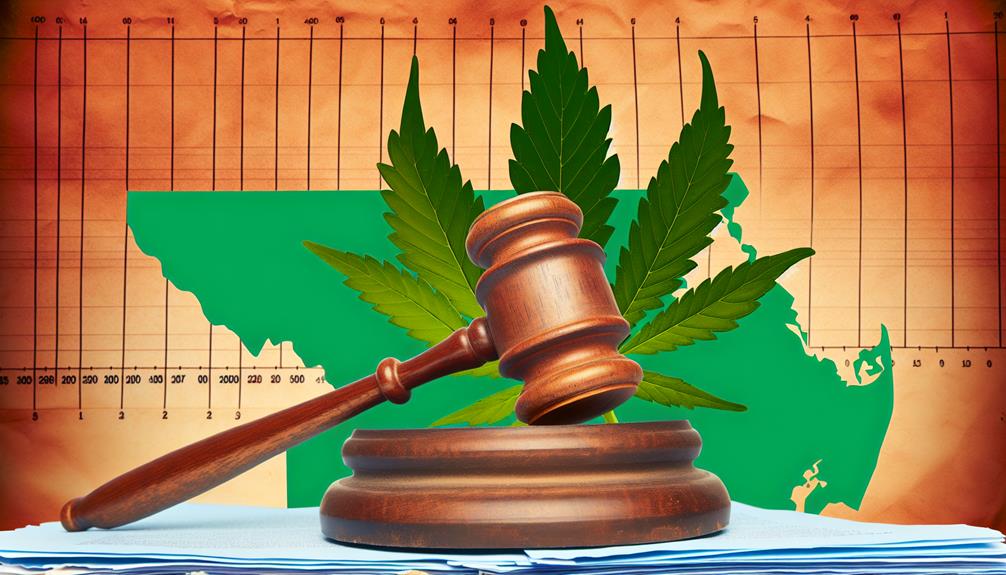You’re probably aware that Delaware’s Medical Marijuana Program has been operational since 2011, but have you ever pondered the specifics? For instance, did you know there are only three dispensaries servicing the entire state, each strategically located? Or that patients are legally allowed to possess up to six ounces of marijuana, but only if they’ve obtained a Medical Marijuana Program card? And what about the future of the program? While we won’t reveal all the details just yet, we can assure you it’s worth sticking around for.
Table of Contents
Legal History of Delaware’s Program

You might be surprised to learn that Delaware’s journey toward legalizing medical marijuana began just over a decade ago. As someone committed to serving others, it’s crucial to understand the legislative milestones that built this program from scratch.
In 2011, Delaware became the 16th state to pass legislation allowing the use of medical marijuana. This was a significant milestone, spurred on by shifting public opinion and a desire to provide relief for patients suffering from debilitating conditions. The law, known as the Delaware Medical Marijuana Act, allowed qualified patients to possess up to six ounces of marijuana for medical use.
However, implementation was delayed due to fears of federal intervention. It wasn’t until 2014 when the Department of Justice issued guidance allowing states to regulate medical marijuana that Delaware’s program truly took off.
In 2015, Wilmington saw its first dispensary open its doors – marking another significant legislative milestone.
Throughout this process, public opinion played an instrumental role. Advocacy from patients, healthcare providers, and the general public helped shape the program, demonstrating the importance of community involvement in shaping policies that serve others.
Understanding this history equips you to better navigate and contribute to the ongoing dialogue around medical marijuana.
Current Medical Marijuana Regulations

Navigating through Delaware’s current medical marijuana regulations can seem complex, but with a detailed understanding, it becomes more manageable. The laws are designed to ensure patient access while maintaining rigorous dispensary regulations.
You should know that dispensaries in Delaware are limited to three, each serving a specific county. These dispensaries, also known as Compassion Centers, are tightly regulated to guarantee the safe and controlled distribution of medical marijuana. They cannot be within 1000 feet of a private or public school or within 300 feet of a residential area – ensuring community safety.
Regulations strictly monitor patient access. To acquire medical marijuana, you must be a Delaware resident and obtain a Medical Marijuana Program (MMP) card. The application process involves obtaining physician’s certification verifying that you have a qualifying condition.
It’s crucial to recognize that personal cultivation is not allowed even if you have an MMP card. All medical marijuana must be purchased from a licensed dispensary.
Understanding these regulations is essential not only for medical marijuana patients but also for those who aspire to serve this community in Delaware. It’s about balancing access with safety – ensuring everyone’s wellbeing.
Qualifying Conditions for Patients

Delaware’s list of qualifying conditions for patients seeking medical marijuana treatment is quite extensive. The state’s stipulations aim to ensure patient eligibility is both fair and thorough, covering a wide range of health concerns.
Conditions such as cancer, HIV/AIDS, decompensated cirrhosis, ALS, Alzheimer’s disease, and Post-Traumatic Stress Disorder are all included. Conditions like chronic debilitating migraines, severe chronic pain, and debilitating anxiety are also considered eligible.
If you’re dealing with persistent muscle spasms such as those caused by Multiple Sclerosis or severe nausea – you might qualify too.
Moreover, if you’re struggling with a condition that hasn’t been listed but it’s severe and resistant to conventional medicine – Delaware’s law allows doctors to recommend medical marijuana as a treatment option. This flexibility underlines the program’s focus on patient well-being and access to alternative solutions.
It’s important to consult with your healthcare provider to discuss your symptoms and treatment options. They can guide you through the process – helping you ascertain if medical marijuana might be beneficial for your specific situation.
Application Process for Patients

Navigating through the application process for medical marijuana treatment in Delaware might seem intimidating at first glance but it’s actually more straightforward than it appears.
Your journey starts with evaluating patient eligibility. You must be a Delaware resident and diagnosed with one of the qualifying medical conditions such as cancer, HIV, ALS, or severe chronic pain.
Once you’ve established your eligibility, the next step involves meeting application requirements. You need to submit a complete application that includes a physician certification form – proving that you suffer from a qualifying condition.
Your certifying physician must be licensed in Delaware and have a bona fide physician-patient relationship with you. Additionally, you’ll need to provide a copy of your Delaware state ID or driver’s license along with a $125 application fee.
The Delaware Department of Health and Social Services reviews all applications – a process that takes about 45 days.
Future Prospects of the Program

While the application process for medical marijuana in Delaware is fairly systematic, it’s also crucial to look forward at what the future holds for this program. As you continue to serve others, understanding the potential economic impact and patient accessibility of this initiative can help you make informed decisions.
The future of Delaware’s medical marijuana program seems promising. There’s potential for increased patient accessibility as the state continues to refine and expand its regulations. More dispensaries might open up in areas currently underserved – reducing travel time for patients. This can be particularly beneficial for those with debilitating conditions who may struggle with long distance travel.
On the economic front, the program could contribute significantly to Delaware’s economy. As the industry grows job opportunities within cultivation, dispensary operations, and regulatory bodies might increase – providing a boost to the local economy.
Additionally, taxes collected from marijuana sales could be funneled back into healthcare and education – benefiting the community at large.
Conclusion
So, you’ve learned about Delaware’s medical marijuana program – from its history to its future. Remember, it’s not just about access to medicine but also about balancing community safety. Whether you’re a patient or just an observer, it’s hard not to feel hopeful about the program’s prospects. As it expands, it may not only provide relief to more patients but also stimulate economic growth. Aren’t we all excited to see what the future holds?
If you’re curious to dive deeper into the details or have any questions – I invite you to visit Cannabis Docs of Delaware. You can also give us a call at (855) 420-6797. We’re here to help and would love to chat with you about all things related to Delaware’s medical marijuana program. Let’s explore this exciting journey together!

